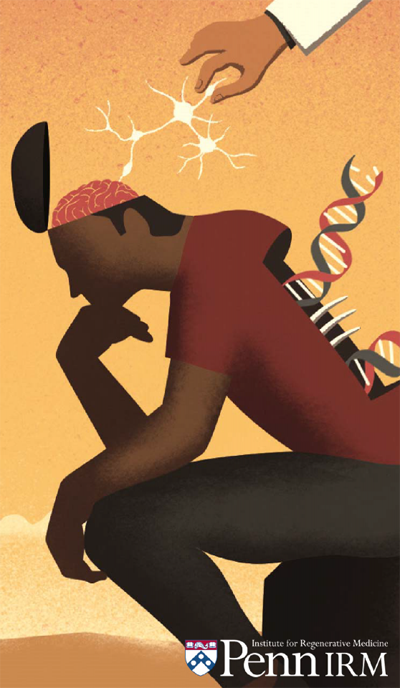
Click for PDF of invitation
PHILADELPHIA – Genetic, stem cell, and reproductive technologies that have the capability to fundamentally change our cells is challenging what is means to be human. Correcting underlying mutations to cure human genetic disorders; reprogramming skin cells to other cell types to one day inject back into a person, or manipulating the genes of a sperm cell or egg to eliminate a sex-linked mutation are all current examples of these techniques that spur social, ethical, and moral questions. Leading biologists and bioethicists from the
Institute for Regenerative Medicine at the
University of Pennsylvania, and other institutions, will come together to discuss these topics in a day-long symposium entitled, “Managing Cell and Human Identity.” The IRM is led by
Kenneth Zaret, PhD, a professor of Cell and Developmental Biology at the
Perelman School of Medicine . A Perspective in
Science magazine published today with the same title considers how our perceptions about human identity may help us decide how and when to use these technologies.
WHERE:
Biomedical Research Building, Perelman School of Medicine, 421 Curie Boulevard, Philadelphia PA, 19104. See here for directions and map. Event is free.
WHEN:
Wednesday, April, 26 8:30 – 9:00 Registration and Breakfast
SCHEDULE:
8:30-9:00 AM Registration and Breakfast
9:00 AM Introductory Remarks
J. Larry Jameson, M.D., Ph.D., Dean of Perelman School of Medicine
Dawn Bonnell, Ph.D., Vice Provost for Research
9:15-9:45 AM Controlling Genes and Cells: The present and future of regeneration technologies
Ken Zaret, Ph.D., University of Pennsylvania Joseph Leidy Professor
Director, Institute for Regenerative Medicine
9:45-10:30 AM Our Bodies, Our Selves: Theologies and Ethics for Unstable Embodiment
Laurie Zoloth, Ph.D., Northwestern University President of Faculty
Senate Director of Graduate Studies in the Department of Religious Studies
10:30-10:45AM Civic Engagement within the IRM: Lessons learned from the community
Jamie Shuda, Ed.D., Director of IRM Life Science Outreach
10:45-11 AM Coffee Break
11-11:45 AM Why Do We Want to Be Human?
Jonathan Moreno, Ph.D., University of Pennsylvania
David and Lyn Silfen University Professor
11:45-12:30PM Discussion Panel
12:30-1:30 PM Lunch
1:30-2:15 PM More Than Your Genes
Reed Pyeritz, M.D., Ph.D., University of Pennsylvania William Smilow Professor of Medicine
2:15-3:00 PM Evolving Attitudes toward Heritable Genomic Modification
R. Alta Charo, J.D., University of Wisconsin Law School
Warren P. Knowles Professor of Law and Bioethics
3:00-3:15 PM Coffee Break
3:15-4:00 PM How Much Longer Will We Be Human?
John Gearhart, Ph.D., University of Pennsylvania
James W. Effron University Professor
4:00-4:45 PM Discussion Panel
4:45-6:00 PM Reception
Penn Medicine is one of the world’s leading academic medical centers, dedicated to the related missions of medical education, biomedical research, excellence in patient care, and community service. The organization consists of the University of Pennsylvania Health System and Penn’s Raymond and Ruth Perelman School of Medicine, founded in 1765 as the nation’s first medical school.
The Perelman School of Medicine is consistently among the nation's top recipients of funding from the National Institutes of Health, with $550 million awarded in the 2022 fiscal year. Home to a proud history of “firsts” in medicine, Penn Medicine teams have pioneered discoveries and innovations that have shaped modern medicine, including recent breakthroughs such as CAR T cell therapy for cancer and the mRNA technology used in COVID-19 vaccines.
The University of Pennsylvania Health System’s patient care facilities stretch from the Susquehanna River in Pennsylvania to the New Jersey shore. These include the Hospital of the University of Pennsylvania, Penn Presbyterian Medical Center, Chester County Hospital, Lancaster General Health, Penn Medicine Princeton Health, and Pennsylvania Hospital—the nation’s first hospital, founded in 1751. Additional facilities and enterprises include Good Shepherd Penn Partners, Penn Medicine at Home, Lancaster Behavioral Health Hospital, and Princeton House Behavioral Health, among others.
Penn Medicine is an $11.1 billion enterprise powered by more than 49,000 talented faculty and staff.